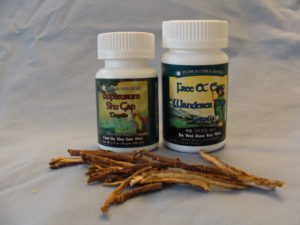In my acupuncture practice, I see a number of people who struggle with emotional symptoms, such as stress, depression, anxiety, or irritability. Jolene* is one of those people. She works long hours at her sales job, takes care of unappreciative ailing parents, and struggles to make ends meet. Essentially, her life is not going how she would like, and it makes her depressed and irritable.
Jolene comes in for acupuncture every couple of weeks, and she feels better for a while. However, the circumstances of her life are unchanged, so the acupuncture treatments can only do so much. In between treatments, I have prescribed an herbal formula containing bupleurum for Jolene to soothe her Liver. You see, her Chinese Liver is not moving smoothly, and the herbs, especially the bupleurum, help.
 In Chinese medicine, one of the functions of your Liver is to gently help your bodily functions to flow smoothly. This includes digestion, energy, the menstrual cycle, and even your emotions. Whenever you experience strong negative emotions for a prolonged period of time, it almost always causes constrained flow of your Chinese Liver.
In Chinese medicine, one of the functions of your Liver is to gently help your bodily functions to flow smoothly. This includes digestion, energy, the menstrual cycle, and even your emotions. Whenever you experience strong negative emotions for a prolonged period of time, it almost always causes constrained flow of your Chinese Liver.
There are a number of Chinese herbal formulas for emotional conditions, and choosing the appropriate formula depends on accompanying symptoms. That said, one of the most common herbs in many of those formulas is bupleurum, or Chai Hu.
In ancient times Chai Hu was originally prescribed for diseases that alternated between a high fever and chills with profuse sweating, like malaria. In Chinese theory, these wide swings in body temperature mean that a relatively benign fever was moving deeper into the body and becoming more serious.
There is an ancient story about Chai Hu in which a young man who worked for an important official became ill with heavy sweating and alternating fevers and chills. The official sent the young servant away because he was too sick to work, but the young man had no place to go. The sick servant wandered around until he collapsed by a pond. After some time, he became hungry and thirsty, so he began to drink from the pond (gross!) and eat some plants that were growing beside it. After several days of surviving on pond water and the nearby plants, the servant regained his strength and went back to work. About a year later, the official’s son became ill with the very same symptoms as the young servant. The official asked the servant to go back to the pond to gather the plants that he had eaten when he was ill. Needless to say, the official’s son recovered after eating the plants; the plant was Chai Hu, and it is still used to this day for alternating fevers and chills.
My patient, Jolene, does not have a fever and chills, yet she takes a formula that includes a fair amount of Chai Hu anyhow. This is because an important secondary function of this herb is to sooth and move constrained Liver energy. Chai Hu is especially good in cases where Liver stagnation causes symptoms such as chest or rib pain, irritability, and menstrual problems (PMS, cramping, etc.) In addition, Chai Hu is good when emotional upsets interfere with the digestive process (remember, everything needs to flow), causing symptoms such as bloating, nausea, indigestion, and loss of appetite.
Beyond acupuncture and Chinese herbs, if you are struggling with depression, stress, irritability, and even anger, there are a few things you can do on your own to sooth your Liver energy. The following suggestions come from Simple Steps: The Chinese Way to Better Health:
- The secret to soothing your Liver is flexibility—both physically and in your thinking. Emotional flexibility can be expressed through creative endeavors and trying to see things from another viewpoint. Physical flexibility can be accomplished through stretching, or through disciplines such as Yoga, Qi Gong, or Pilates.
- Exercise—moving your body moves your body’s energy. Almost everyone who exercises feels better physically and emotionally afterward because they have created flow, and flow feels good.
- Choose sour foods for their ability to cleanse your Liver. Dill pickles, vinegar, or dressings with lemon are all good choices.
- Each of the organ systems in Chinese medicine is associated with a color that provides health and balance. The color related to your Liver is green, so choose dark leafy greens, sprouts, salad greens, and early spring plants whenever possible.
*name and identifying details changed




Hi Lynne,
Great article and solid advice. This explains the reason why the harmonizing formulas such as Xiao Yao San, Jia Wei Xiao Yao San, Xiao Chai Hu Tang, and even Bu Zhong Yi Qi Tang are some of the best selling formulas on the planet. I’d love to send you a sample of our Great Nature Classics of any one of these formulas for you to try. Let me know if you’d like a free sample. I hope you are well the thriving along with your patient, Jolene!
Happy Holidays and all good things to you,
Honora Wolfe
Honora-
So true! The harmonizing formulas are the ones I prescribe the most in my practice. My practice partner have and continue to use Blue Poppy formulas and think they’re excellent. I would love to try a sample of your Great Nature Classics–how about Jia Wei Xiao Yao San? That seems to be the one of the formulas I prescribe most frequently. Thank you so much!
Thanks for your diet’s advice to soothe the liver. It’s interesting how the Liver effects the physical and emotional wellbeing. http://www.therapyworldwide.com